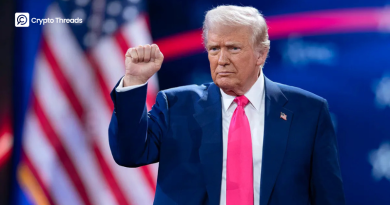GENIUS Act Passes Critical Senate Vote: US Stablecoin Regulation Takes Step Forward
Senate passes cloture vote ( The Crypto Times )
The US Senate has made a historic move in cryptocurrency regulation, voting 68-30 to advance the GENIUS Act (Guiding and Establishing National Innovation for US Stablecoins) through a crucial procedural hurdle. This landmark vote brings the United States significantly closer to establishing its first comprehensive federal framework for stablecoin regulation.
What the GENIUS Act Senate Vote Means
The cloture vote represents a critical milestone in US crypto policy. With bipartisan support from both Republicans and Democrats, the legislation now advances to full Senate debate and voting, potentially becoming the first major crypto regulation to pass Congress.
Senate Majority Leader John Thune championed the bill from the Senate floor, echoing President Trump’s vision to make America the “crypto capital of the world.” The vote demonstrates growing congressional consensus on the need for clear stablecoin oversight.
Stablecoin regulation framework overview ( Binance Research )
Key Provisions of the GENIUS Act
The legislation establishes several groundbreaking requirements for stablecoin issuers:
Reserve Requirements
- Full backing by US dollars or highly liquid assets
- Mandatory segregation of customer funds
- Priority claims for stablecoin holders in bankruptcy proceedings
Regulatory Oversight
- Dual federal-state supervision framework
- Annual audits for issuers exceeding $10 billion market cap
- Enhanced consumer protection measures
Innovation Flexibility
Unlike the House’s STABLE Act, the GENIUS Act permits algorithmic stablecoins under specific conditions, reflecting a more innovation-friendly approach to digital asset regulation.
Political Dynamics and Opposition
Despite broad support, the vote faced notable resistance. Senator Elizabeth Warren raised concerns about potential conflicts of interest, specifically citing President Trump’s involvement with World Liberty Financial and his family’s crypto ventures.
“Through his crypto business, Trump has created an efficient means to trade presidential favors,” Warren stated during floor debate, arguing the legislation lacks adequate safeguards against corruption.
The bill also faces challenges from 122 proposed amendments, indicating ongoing disagreements over specific regulatory provisions.
Market Impact and Industry Response
The $247 billion stablecoin market could experience dramatic growth under clear federal regulation. Industry analysts project potential expansion to $2 trillion by 2028 if comprehensive legislation passes.
Major stablecoin issuers like Tether (USDT) and Circle (USDC) have expressed cautious optimism about regulatory clarity, while traditional financial institutions see opportunities for mainstream adoption of digital payment rails.
Capitol Hill crypto legislation ( Ledger Insights )
GENIUS Act vs STABLE Act: Key Differences
The Senate’s approach differs significantly from the House’s STABLE Act:
GENIUS Act Advantages:
- Allows yield-bearing stablecoins
- Flexible state-federal regulatory framework
- Conditional approval for algorithmic stablecoins
STABLE Act Restrictions:
- Two-year ban on algorithmic stablecoins
- Prohibits interest payments to stablecoin holders
- More restrictive federal oversight requirements
Next Steps and Timeline
Following the cloture vote, the GENIUS Act faces several remaining hurdles:
- Full Senate Vote – Expected within days
- House Reconciliation – Differences with STABLE Act must be resolved
- Presidential Signature – Trump administration strongly supports passage
The parallel advancement of the House’s CLARITY Act for broader crypto market structure suggests Congress is moving aggressively on digital asset policy during the current session.
Investment and Regulatory Implications
The legislation’s advancement signals a fundamental shift in US crypto policy. Institutional investors should prepare for:
- Enhanced regulatory clarity reducing compliance uncertainty
- Potential mainstream adoption of stablecoin payment systems
- Integration of digital assets into traditional financial infrastructure
For retail investors, successful passage could mean greater consumer protections and expanded access to regulated stablecoin products through traditional financial institutions.
Stablecoin ecosystem growth ( SoluLab )
Conclusion: Historic Moment for Crypto Regulation
The GENIUS Act’s Senate advancement represents the most significant progress on US crypto regulation since Bitcoin’s inception. With strong bipartisan support and Trump administration backing, the legislation appears positioned for passage despite remaining political challenges.
The vote establishes momentum for comprehensive crypto regulation that could position the United States as the global leader in digital asset innovation while maintaining appropriate consumer and systemic risk protections.
Industry stakeholders should monitor upcoming Senate debate closely, as amendments could significantly alter the final legislation’s scope and impact on the rapidly evolving stablecoin ecosystem.



